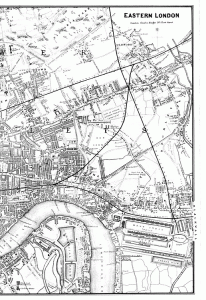 The English language is peppered with a number of words of unclear origin, but which in fact belong to the lexical group known as Polari. Polari is an almost extinct form of slang, which probably developed in the circus milieu of 19th century London and was later adopted by the gay community of the English capital. Polaris (also known as Parlare, Parlary and by other phonetic alternatives) has enjoyed in the last couple of decades some academic consideration, having been relegated for most of its history to the shadows of formal linguistic studies. Currently, its use is limited to a few words (some of which, like the word zhoosh, have been collected in the Oxford English Dictionary); not long ago, however, Polari reached a much wider exposure, thanks in part to its use in the BBC’s comedy show Round The Horne. In it, two characters of pronounced affectation, Julian and Sandy, would immerse themselves in conversations that, for the uninitiated, were practically incomprehensible (this, however, did not prevent their becoming very popular).
The English language is peppered with a number of words of unclear origin, but which in fact belong to the lexical group known as Polari. Polari is an almost extinct form of slang, which probably developed in the circus milieu of 19th century London and was later adopted by the gay community of the English capital. Polaris (also known as Parlare, Parlary and by other phonetic alternatives) has enjoyed in the last couple of decades some academic consideration, having been relegated for most of its history to the shadows of formal linguistic studies. Currently, its use is limited to a few words (some of which, like the word zhoosh, have been collected in the Oxford English Dictionary); not long ago, however, Polari reached a much wider exposure, thanks in part to its use in the BBC’s comedy show Round The Horne. In it, two characters of pronounced affectation, Julian and Sandy, would immerse themselves in conversations that, for the uninitiated, were practically incomprehensible (this, however, did not prevent their becoming very popular).
The origins of Polari are not entirely clear. We know that much of it originated in the Italian lexicon, but what is not known for certain is whether its introduction into the English language took place through the seaports (with Italian and Occitan terms commonly used on the ships as the lingua franca of the Mediterranean) or whether it is related to the activity of people in show business who came from Italy and settled in London in the middle of the 19th century. Most likely, these two aspects merged somehow and were later complemented by the influence of Yiddish and Roma, two nomadic languages whose impact on major languages deserves special attention. In any case, its use spread among the gay community of London who, as a minority, started using Polari as an inside code. The late but ever increasing integration of minorities and marginal groups put an end to the need of these groups to encode their speech, and so Polari ended up being used almost exclusively as a nostalgic impulse.
On the Web you can find many of the most common words of this almost forgotten slang, including:
bona: good
camp: effeminate
capello: hat
cottage: public restroom
dolly: beautiful, nice
ecaf: face
drag: clothing, especially women’s
gelt: money
jarry: food
omi: man
In this short list, we can see many of the trends that led to the formation of Polari. The Italian influence (“jarry,” food, comes from the Italian verb mangiare, to eat); the rearrangement of letters (as in “ecaf,” from face; it also results in the short form “eek”); the concern with the legislation on homosexuality (“camp” came from the acronym KAMP: known as male prostitute); or the presence of Yiddish (gelt). It is unfortunate that Polari should have fallen into disuse—from the point of view of linguistic diversity—but the fact that a particular community no longer needs to use a closed code in their communication in order to avoid various forms of prejudice, no doubt deserves to be celebrated.
To read the original Spanish post go to:
¿Qué es el polari?
